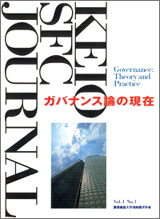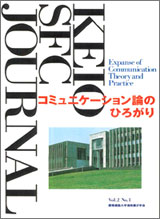- HOME
- KEIO SFC JOURNAL
- Vol.1 No.1

KEIO SFC JOURNAL Vol.1 No.1 Governance: Theory and Practice
published on 2002.06
-
Legal Characteristics of Religious Obligations in Islam − An Approach to Construction of Theory of Governance
Atsushi Okuda Associate Professor, Faculty of Policy Management, Keio University Religious rituals in Islam, such as prayers, paying of alms and fasting, may well be regarded as private actions in accordance with the traditions of muslims. However, these rituals are performed voluntarily by every muslim as basic, prescribed obligations of a very social and public nature, as they provide the society with the foundation of its existence. The obligations shared among all muslims regardless of differences of individual races, nations, nationalities, social strata etc., are 'primary rules of obligation' which are formed indeependently of the power of the state. This kind of perception of Islamic rituals can open new perspectives for understanding Islam in the era of post 'orientalism' and the construction of a more comprehensive theory of governance.
-
Critique interne delademocrati eliberale chez Alexis de Tocqueville
Yasutake Miyashiro Part-time Lecturer, Faculty of Policy Management, Keio University Critique interne de la democratie liberale : telle est la lecture que nous proposons dans le present article sur De la democratie en Amerique. Dans son ouvrage, Alexis de Tocqueville a releve quelques difficultes inherentes a la democratie moderne. Mais faut-il en conclure que la philosophie tocquevillienne vise a destituer, dans un esprit dit conservateur, les principes memes de la modernite socio-politique ? N'est-il pas plus exact de dire que le penseur a tente de faire une auto-critique de la democratie liberale, et que cette critique, disons interne, avait pour but d'eclairer les conditions requises pour que la societe moderne conserve les liens sociaux sans abandonner les valeurs de l'independance individuelle qui la caracterise ? Nous nous efforcons de degager le sens de la critique qu'a formulee Tocqueville en ce qui concerne l'homo democraticus.
Download this article (PDF):SFCJ1-02.pdf -
Environmental Knowledge − its morphology function and outcome
Hiroyuki Yoshida Assistant Professor, Faculty of Policy Management, Keio University How 'environmental knowledge' functions as power in the contemporary world is examined in this paper. Environmental knowledge provides networks of consensus which function as power. Effects of 'environmental knowledge' in the form of decisions imposed on environments, effects of power in the domain of forces of Nature in other words, cannot help being governed by probability. Inhabitants of local environments live or die incidentally under foreign 'environmental knowledge'. They are on the borderline between power and forces. The matter of life and death for local communities is, however, only material to keep playing the game of science and politics for research and decision making communities. The same process repeats, and the rhizome of 'environmental knowledge' is increased. The structure reproduces itself through the process.
-
Analysis of Poland's Environmental Improvement in the 1990's − A Perspective of Governance Theory
Akira Ichikawa Doctoral Program, Graduate School of Media and Governance, Keio University In the revolutions of 1989, environmental movements played a very important political role, which subsequently declined in the post-revolutionary period. In order to join the EU, Poland had to somehow manage two seemingly contradictory policies, to simultaneously develop the economy and improve the environment. In the early 1990's the, national government played a major role in maintaining the system, such as through the National fund, Eco Fund, and by creating the National Environmental Policy. In the late 1990's, NGOs and local governments became increasingly assertive actors on this issue in response to the EfE process. The process of improving the environment in Poland is now slowly but steadily progresing with a "shift towards a multi-centered society, decentralization of authority, and establishment of a civil society".
Download this article (PDF): SFCJ1-04.pdf -
Migration as a problem, as an industry, and as a strategy − Cases in Northeast Thailand
Atsushi Watabe Doctoral Program, Graduate School of Media and Governance, Keio University This paper shows living strategies of rural people of Khon Kaen, Northeast Thailand, through interviews with the migrants and their families. The Thai government recognizes migration as either an individual act by "poor drifters" or "venturous foreign currency earners". On the other hand, many theorists attack such a recognition and argue that migrants are forced to move by the global labor supply system. However, I have discovered throughfieldwork that people neither decide individually to move, nor are merely forced to move. Perceiving global movement at the local level, people have begun to construct alternative modes of life, encompassing such concepts as migration.
Download this article (PDF): SFCJ1-05.pdf -
The Study of a Policy for the Promotion of Realistic Normalization through the Adoption of "CVM" − The Illustration of Superiority of a Financial Burden According to the Amount of Income
Toshiki Nishiyama Doctoral Program, Graduate School of Media and Governance, Keio University Ken'ichi Gomyo Master's Program, Graduate School of Media and Governance, Keio University Makoto Arisawa Professor, Faculty of Environmental Information, Keio University It is important to remove barriers in the trans-portation environment. However, engineering studies are inclined to focus on the developers 'financial restrictions and citizens' position. In addition, in many regional policy studies customer satisfaction is dealt with by a survey. Therefore the authors apply "CVM" to measure the amount of technique which citizens require in terms of money, taking the promotion of widespread normalization and the developers' financial limitations into account. As a result, the authors recognized that the larger the citizens' income is, the higher the citizens' "WTP" becomes for improving non-barrier transportation systems becomes. That is, the developers should collect the cost of establishing the non-barrier transportation system according to the scale of household economy.
Download this article (PDF): SFCJ1-06.pdf -
Is India's Banking Sector Reform Successful ?
Sayuri Shirai Associate Professor, Faculty of Policy Management, Keio University Prithipal Rajasekaran Research Associate, Asian Development Bank Institute The banking sector reforms launched since 1991 have brought several noticeably favorable changes in India's highly regulated and repressed banking sector. The performance of public sector banks has improved and has become comparable to foreign and private sector banks over the decade, mainly due to pressures from competition, diversification of business, and reforms in priority sector lending. However, the banking sector still remains dominated by public sector banks, suggesting an urgent need for more drastic reforms in the banking sector.
-
Swords and Ploughshares − Military-NGO interface in peace operations
Garren Mulloy Visiting Lecturer, Faculty of Environmental Information, Keio University This article aims to examine the relationships between military and civilian staff in complex peace operations and identify problematic areas. Differences between the military, NGO, and IGO are studied in terms of doctrine, structure/culture, working relationships, and their impact upon missions. The interference in the UN operational structure by nation states is identified as compromising the mission head's powers of initiative, and removing management from the hands of those charged with the conduct of operations. This 'structural compression' of operational hierarchy is a major threat to peace missions.
-
Recent Trends in Research on Corporate Governance : A Survey
Mitsuaki Okabe Professor, Faculty of Policy Management, Keio University This paper first clarifies the concept of corporate governance, then surveys various relevant issues by pointing out : (1) reasons why this research has been actively conducted in recent years, (2) distinctive characteristics of the research, (3) special characteristics in the case of the Japanese firm, (4) some issues on the frontier of this field of research, and (5) issues for future research. Overall, the paper argues that a better understanding of the system of a country's corporate governance can be gained by not applying a single theory but by duly taking historical, social and cultural factors of the country into account.
Download this article (PDF): SFCJ1-09.pdf
